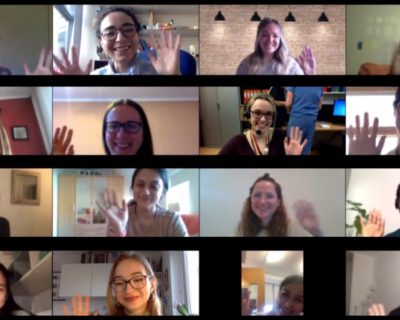Branch
Select your branch
Design Thinking Workshop: Oxford as a Future City
Design Thinking Workshop: Oxford as a Future City
In April Innovation Forum Oxford held the first of four ACE Saturdays Workshops—with a packed audience of innovators and thinkers. The ACE (Awareness, Connectivity, Exchange) Saturdays program is supported by Knowledge Exchange and Impact (KEI) funding from the University of Oxford and is designed to bring together individuals in the Oxford ecosystem to share knowledge and experiences to broaden horizons and foster innovative collaboration.
The workshop’s theme was imagining the future of Oxford as a connected city with a particular focus on transportation and autonomous vehicles. Participants were trained in the Design Thinking methodology by expert coaches Alejandro Lecuna and Morganne Graves in a day packed with user research, ideation, prototyping, testing and an awful lot of post-it notes.
The day began with an introduction to the challenge by George Economides (Connected and Autonomous Vehicles Team Leader, Oxford City Council) who showcased the past and future transportation initiatives for the city of Oxford. Participants also learnt about many of the projects from the Smart Oxford initiative, which is equipping Oxford to be a city at the forefront on learning and innovation for the 22ndCentury.
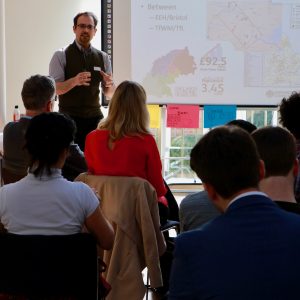
Entrepreneurs, clinicians, students and professionals formed teams and started the design thinking process by interrogating the challenge “Design the autonomous vehicle experience for people living and working in Oxford…in a world where societal, environmental and technological changes are becoming increasingly disruptive.” The groups used this process to extract themes and ambiguities that informed questions to be asked of potential users: what would people on the street today want from Oxford as a city in the future…and how varied would their perspectives be?
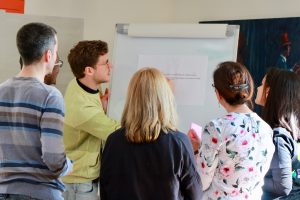
After interview training and role-playing with one another, the teams hit the streets to interview potential users of their design solution and to start understanding their needs first-hand. Participants interviewed an impressive scope of potential users and sought the opinions of families, tourists, commuters, residents, students and the disabled.
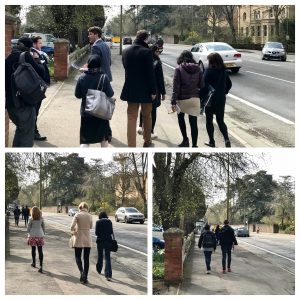
Many interviews revealed unique and insightful information that underscored the incredible value of a design thinking methodology. The importance of getting user input as early as possible in the process also became clear if teams were to avoid the risk of creating an unneeded design solution in search of a user with a problem.
“I still want to learn how to drive. For me it’s like knowing you’ll be given a life jacket…but you still want to know how to swim.”
–Potential autonomous car user interviewed by workshop participants
After a lunch filled with lively conversation and stories of interview successes each design team synthesised their findings to create an abstract user with well-known problems and needs that could begin to be addressed. Participants worked together as teams to debate and prioritise needs, while sowing the seeds of design solutions specific to users’ time, budget, location, fears, and dreams.
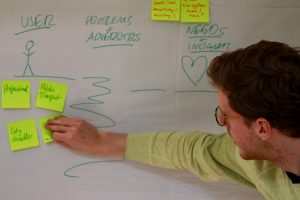
By mid-afternoon the room was alive with creativity as the teams developed and iterated design concepts. In a few intense hours, with coffee breaks ignored and inspirational pipe cleaner construction skills on display, each team created a prototype solution ready for feedback and input from industry experts Andrew Bradley (Automotive & Motorsport Engineering, Oxford Brookes University) and Garry Staunton (UKAEA/RACE Autonomous Vehicles). After expert consultation each them took stock of their design—deciding what worked, what needed improving, and how to integrate new insights.
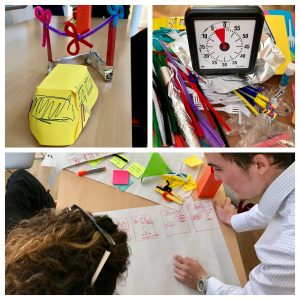
At the end of a long afternoon of creating each team pitched their final design concept to the other participants and a panel of expert judges. Working from the same design challenge teams conceived of a wonderfully diverse range of concepts addressing challenges to a more autonomous future in both practical and fun ways—and in all cases deeply rooted in the human experience of users. Design solutions included self-driving pods with customisable seating configurations and interiors; robotic chairs to interface between the home and a vehicle; family-focussed holographic personal mapping; an autonomous educational theme park; and autonomous day-care vehicles to delight parents as key societal change-makers.
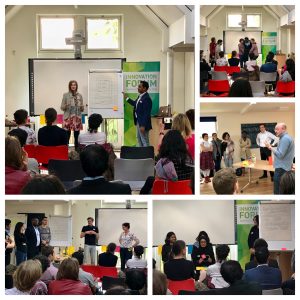
The design-filled day ended with drinks and dinner where teams could relax and network. We were so excited to watch incredible ideas be born and to see the benefits of design thinking training in such a short period of time. Finally, thank you to all Innovation Forum Oxford’s local partners including University of Oxford, Oxford Careers Centre, Weatherall Institute of Molecular Medicine, Oxford Biomedical Research Centre, Triteq, James Cowper Kreston, Pennington Manches and Thinking of Oscar.







